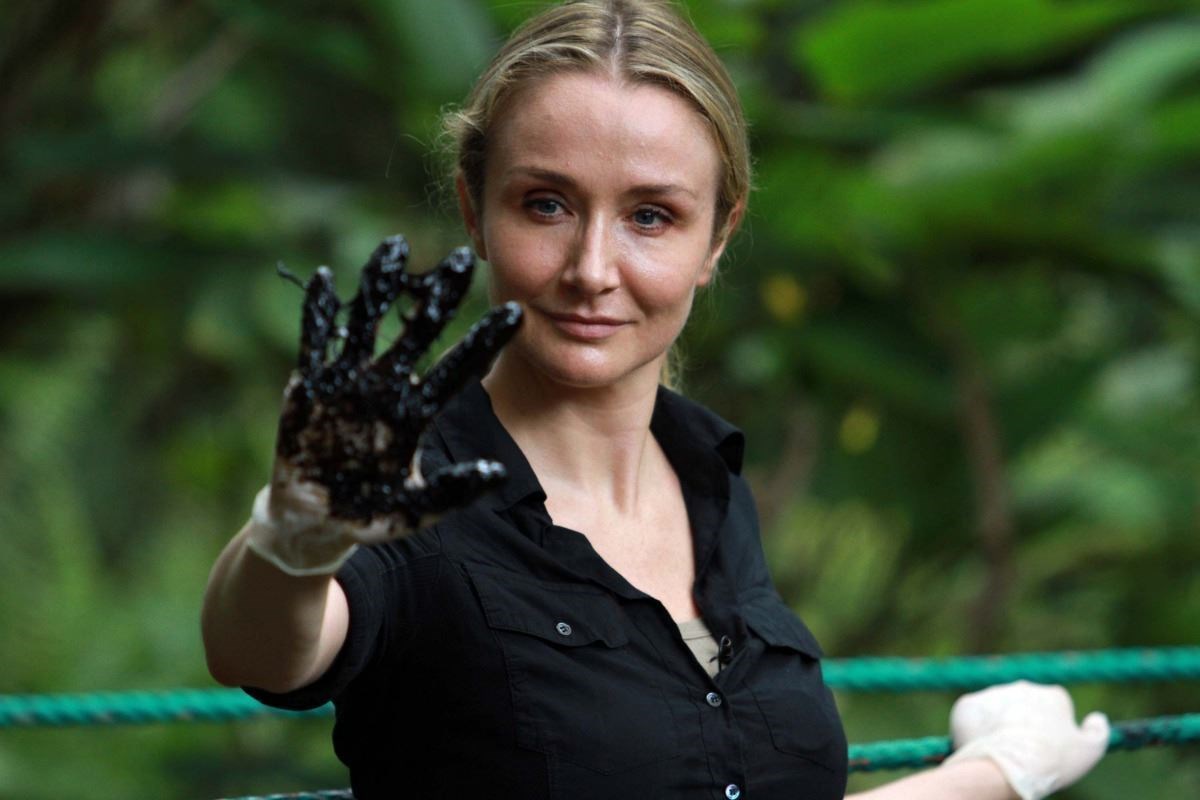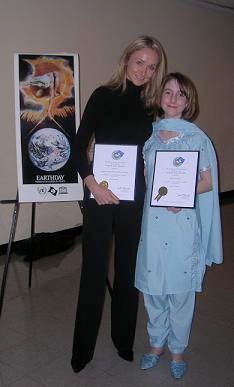Slater writes: I believe strongly in saving our home, our planet and its oceans. It grieves me to know that to some, global warming is a vague rumour, a colourful story to tell and nothing more. That's why when I met Alexandra Cousteau, I really wanted to help get her message out there, to inform others of this strong being who is truly making a difference. Alexandra Cousteau has launched a great expedition and you can follow her adventure online. Visit her website: https://www.alexandracousteau.com/
Everything you do makes a difference." - Alexandra Cousteau
 Alexandra CousteauCancillería Ecuador / CC BY-SA (https://creativecommons.org/licenses/by-sa/2.0)
Alexandra CousteauCancillería Ecuador / CC BY-SA (https://creativecommons.org/licenses/by-sa/2.0)
“Animals living in the waters, especially the sea waters . . . are protected from the destruction of their species by man. Their multiplication is so rapid and their means of evading pursuit or traps is so great, that there is no likelihood of his being able to destroy the entire species of any of these animals.”
A lot has changed since 1809. The long pollution-tainted hand of man has touched the oceans of our planet. Marine life is dying off, either by over fishing, pollution of the oceans or being caught in nets and thrown back overboard, as it wasn’t what was being fished for. According to an article on the University of Queensland's website, over 60% of the Great Barrier Reef bleached in 2002. This resulted in 5% of its coral populations dying in one year. National Geographic reports that 38 million sharks a year are killed for shark fin soup. (However scary sharks may seem, they are a vital part of the ocean's ecosystems.) The list goes on and on. It seems that there is no hope to save the oceans and its inhabitants. Well, there is hope. There is one young woman who has dedicated her life to saving and raising awareness about the oceans.
Alexandra Cousteau grew up with the ocean. At four months old she went on her first oceanic expedition with her family, father Phillipe Cousteau, mother Jan, and grandfather Jacques Cousteau. Jacques was the inventor of SCUBA, or self-contained underwater breathing apparatus, and a pioneer in nature documentary filmmaking. Through Jacques Cousteau's documentaries, the world saw the secrets of the oceans for the first time. It seems that Cousteau's love for the ocean has been passed on to following generations. Alexandra co-founded EarthEcho International and founded Blue Legacy and the Shark Alliance. She has traveled around the world, spreading the word about the oceans' current condition and what we can do.
In March 2007, I went to the United Nations in New York City where Alexandra was being honored as an Earth Trustee. As I, too, was honored that evening for my filmmaking and activism, I got a chance to meet and speak with Alexandra. Looking at her, I saw a confident young woman who knew what she was doing and what she was talking about. Recently, I contacted her for an interview. This is what she had to say:
Q: Why do you think that there is such a disconnect when it comes to the environment?
A: Historically, nature has been a wild element that human beings have felt the need to subdue and control. And to a certain extent, we have been successful at that - harnessing the land through agriculture, diverting rivers and building dams, overcoming gravity to fly through the air, designing tools that can strengthen our weaknesses and give us dominion over the environment. The industrial revolution allowed our economies to expand exponentially. Technological advances in science and industry allow us to escape inclement weather and cure illnesses. Inventions like plastic have revolutionized our world. Yet at no point in that process did we stop to consider our impact on the natural world and the consequences of our "progress". Unfortunately, I think that we divorced ourselves from the environment a long time ago. Our world has become so artificial we have forgotten the importance of managing and conserving the natural resources that sustain our lives. What is good for us and sustains our lives is now the "alternative."
Q: What do you think kids and adults alike should do to help save the environment? Our oceans?
A: We need to start living an examined life and considering the consequences of our individual and collective actions. The oceans are the life support system of the planet yet everything that happens on land eventually impacts the oceans. We are all downstream from one another which means that the choices we make about which products to use, the foods we eat, our consumption patterns, managing our waste - all of these choices impact the ocean. Anything a person does to help the environment will help the oceans - recycling, using biodegradable products, cutting back on pesticides and fertilizers, disposing of toxic liquids (such as motor oil, paint thinners, etc.) in appropriate ways, using public transportation - all of these things will help the oceans.
Q: Why did you found 'EarthEcho'?
A: My brother and I founded EarthEcho because we believe that everything you do makes a difference and we wanted to empower people with that message so that everyone could be part of the solution. We leverage the power of the media to engage people of all ages and in all parts of their life to understand what their "earthecho" is and how to take action for a more sustainable lifestyle. All of our actions and projects have this mission and vision.
 Alexandra and Slater at the United NationsJan CousteauQ: Do you think that the global population has an addiction for fish? Do we need to cut back?
Alexandra and Slater at the United NationsJan CousteauQ: Do you think that the global population has an addiction for fish? Do we need to cut back?
A: For billions of people in the world, fish is a major source of reliable protein and an essential part of their diets. Unfortunately, our irresponsible and unsustainable consumption of fish is destroying fisheries that these people depend on. People can still eat fish, but they need to understand that there are consequences - for people and the environment - to eating fish that come from unsustainable sources. Also, more and more fish species are becoming toxic with the chemicals and heavy metals that we are putting into the environment, which is bad for our health and our communities. People need to be more concerned with knowing where their food comes from and how it arrived at their table. Fortunately, it is getting easier and easier to do so. See my blog on EarthEcho for more info about sustainable seafood.
Q: What makes you laugh? What keeps you positive about fighting to save the oceans?
A: I love seeing people who are engaging their communities for sustainability and the environment. I especially love to see young people like you who are excited and dedicated to making a positive difference in the world. This is an inclusive movement and we need all the change agents we can get!
Q: Who is your hero and why?
A: I have many heroes. Some are well known and others are not. But they are all people who inspire, challenge and empower me to see the world in new ways and consider new solutions to old problems. They make me want to be the best I can be.
Q: What is it like working with your mom and your brother?
A: My mom and brother are wonderful to work with. We are very close in everything that we do.
Q: Is there anything else you would like to say?
A: Everything you do makes a difference. Let it be a positive difference for you, your family, your community, and the planet.
Join Alexandra in her quest to save the oceans. Check out the links below and do what you can to help our fish friends and our planet.
Update
Since this interview, Alexandra Cousteau has been actively involved in several initiatives aimed at ocean conservation and sustainability:
2014-2015: Ottawa River Expedition and Aqua Hacking Conference
In 2014, Alexandra led an expedition in Canada in collaboration with the Ottawa Riverkeeper and Aqua Hacking 2015. This initiative focused on safeguarding the Ottawa River and was a joint effort between the Ottawa Riverkeeper, Alexandra's Blue Legacy organization, and the de Gaspé Beaubien Foundation. (lifestylesmagazine.com)
2019: Co-Founding Oceans 2050
In 2019, Alexandra co-founded Oceans 2050, where she currently serves as president. Oceans 2050 is an ambitious project that aims to restore ocean abundance by the year 2050. The organization has published groundbreaking research in Nature Climate Change, demonstrating the significant potential of seaweed farming in combating climate change. Led by Chief Scientist Professor Carlos Duarte, the study is the first to quantify carbon burial beneath seaweed farms on a global scale. The findings confirm that seaweed farms sequester carbon in sediments at rates comparable to well-known carbon-storing ecosystems such as mangroves and seagrasses.
Find out more: oceans2050.com
Ongoing Role with Oceana
Throughout this period, Alexandra has continued her role as a Senior Advisor to Oceana, contributing her environmental expertise to guide the organization's global campaigns focused on ocean protection and restoration. Oceana focuses on achieving science-based policies in key coastal nations to restore and protect abundant and biodiverse oceans. With over 300 victories, the organization’s campaigns have successfully implemented policies that promote ocean conservation and sustainability.
Find out more: oceana.org
Page created on 2/26/2015 2:26:13 PM
Last edited 2/6/2025 12:22:57 PM
